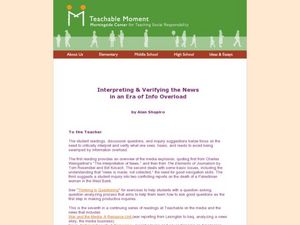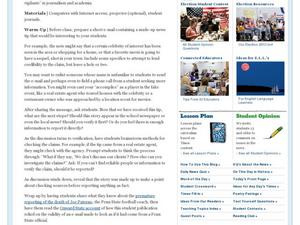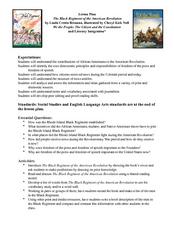American Press Institute
Newspapers in Your Life: What’s News Where?
Big news isn't necessarily newsworthy everywhere! How do journalists decide what to cover with so much happening around them? A instructional activity on media literacy examines the factors that affect the media's choice of stories to...
Curated OER
Interpreting & Verifying the News in an Era of Info Overload
Students practice their critical thinking skills. In this media awareness lesson, students read articles about media overload and interpretation of media. Students respond to discussion questions and discuss how they verify news....
Curated OER
Check It Out: Verifying Information and Sources in News Coverage
If it’s in the news it must be true, right? Prompted by a New York Times article, class members consider the importance of accuracy in reporting and validating sources. The detailed plan includes warm-up exercises, discussion questions,...
Newseum
Covering a Catastrophe: Evaluating Disaster News
Young journalists investigate the various ways to share news about a disaster and evaluate the pros and cons of each of these types of news. Individuals then select two different forms of media reports of a recent disaster. Using the...
Curated OER
The Price of Happiness: On Advertising, Image, and Self Esteem
Are your students aware of the effect advertising can have on their self-image, self-esteem, and happiness? This lesson from the Media Awareness Network is aimed at increasing that awareness and mitigating any negative effects it might...
Curated OER
A Way with Words
How do facts and opinions impact the news? After reading "How to Cover a War" from the New York Times, middle schoolers evaluate the claims in the article. They also consider the media's responsibilities in reporting during wartime....
Southern Poverty Law Center
Evaluating Online Sources
All sources are pretty much the same, right? If this is how your class views the sources they use for writing or research projects, present them with a media literacy lesson on smart source evaluation. Groups examine several articles,...
Facing History and Ourselves
The Power of Images
One picture but a thousand stories. As a part of a case study of how the death of Michael Brown was reported by professional news sources and on social media class members examine the reactions of various groups to a photograph taken by...
Facing History and Ourselves
Verifying Breaking News
The attempts of journalists to verify the events surrounding the shooting of Michael Brown take center stage as individuals analyze three of the initial newspaper accounts of the story. The whole class discussion then focuses on the...
Curated OER
Press Review
How can word choice affect a political speech? Middle and high schoolers examine the text of the 1999 State of the Union Address, and then determine how newspaper articles and television reports describe and analyze the event. Use this...
Curated OER
Comparing the Satellite and Broadcast Radio Landscapes
Students research the development of satellite technology over the last 50 years students explain how the enactment of the Telecommunications Act of 1996 changed the rules for corporate ownership of multiple media outlets.
Media Smarts
The Citizen Reporter
Ripped from the headlines! Discuss topical social issues like racism, discrimination, and diversity while exploring the concept of citizen journalism. Begin with a professional-looking presentation on the history of citizen journalism....
Media Smarts
The Newspaper Front Page
Hot off the presses! A perfect instructional activity idea for a journalism class or even a language arts class looking to incorporate some informational texts. Young writers analyze the front pages of various newspapers to determine the...
Social Media Toolbox
About Facebook
If everyone is on Facebook, should the school's news publication be as well? Scholars study a social media giant in the 11th lesson from The Social Media Toolbox's 16-part series. The activity combines individual study and collaboration...
Curated OER
The News Behind the Story
What a fun way to analyze plot, setting, and character. Learners review story elements, read a short fictional story, then turn the events of that story into a headlining news paper article. Not only does this lesson engage critical...
Media Smarts
Broadcasting Codes
Let your learners be the judges for a series of case studies that focus on broadcast codes in Canada. In order to familiarize your class with the codes and guidelines that govern the broadcasting industry, in particular Canada's...
Curated OER
Journalism: Underage Drinking
Students research underage drinking and read a report in the Journal of the American Medical Association about the issue. They interview experts on substance abuse and liquor store owners about their policies. Students publish their...
PBS
Broadcast News
Just because a story is on the news doesn't mean it's being presented fairly. Analyze news broadcasts with a lesson focused on evaluating television journalism. At home, kids watch a news show and note the stories presented, including...
Curated OER
Bias vs. Perspective: An Inevitable Aspect of Journalism?
Learners explore the types of media that U.S. teens prefer the ways in which viewers identify and account for journalistic bias. They explore the ways in which media shapes one's opinion or affects their judgment.
Curated OER
Investigative Journalism
Students choose newsworthy topics to research and investigate, narrow focus of investigation, get information from the source through interviews, write stories, and submit to media outlets.
Curated OER
Journalism in War Time: What Does the Public Need to Know?
Students view the film "War Feels Like War" about journalist's experiences in the Iraqi War and discuss the role of journalism in war. They evaluate different media sources for war reporting and determine the questions they want to see...
Social Media Toolbox
Verification
When you're putting together a great story, you've got to consider the source! Scholars discover the dangers of errors in reporting during the 14th activity in a 16-part Social Media Toolbox series. Groups collaborate to create a source...
Curated OER
Exploring Media: Understanding and Identifying Editorial Perspective in Television and Radio News
Students research the topics Boat People: A Refugee Crisis, Dr. Henry Morgentaler: Fighting Canada's Abortion Laws, and CANDU: The Canadian Nuclear Reactor on the CBC Radio and Television Archives Web site.
Curated OER
We the People: The Citizen and the Constitution: The American Revolution
The contributions of African-Americans to the American Revolution are the focus of this Social Studies and language arts instructional activity. After reading and discussing Linda Crotta Brennan’s The Black Regiment of the American...
Other popular searches
- Broadcast News
- Broadcast Media
- Journalism Hard News
- Elements of Broadcast News
- Broadcast Media Studies
- Advertising Broadcast Media
- Media Journalism
- Journalism News Ethics

























